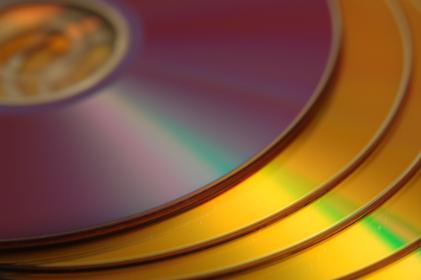DVD
Another current option is a DVD-Recorder. These devices are stand-alone DVD burners that look like a VCR, but instead of using tapes, use DVD's. And you can play the DVD back on any DVD player that you have, whether it is a DVD drive built into your laptop, or even a portable DVD player that you can watch in your car. DVD's are more portable than VHS tapes, and with higher quality videos.
PRO'S
- Portability - you can take a DVD anywhere and play it on anything that has a DVD or Blu-Ray player.
- Video has higher resolution than VHS.
- Picture will not degrade from repeated viewings or storage.
- Doesn't take up a lot of storage space.
CONS
- Very few DVD-R DL dual-layer recorders out there. Majority are DVD-R SL single layer recorders
- Maximum recording time at it's best quality (XP) is only 62 minutes in single layer recorders and 4.7GB discs, 124 minutes in dual layer recorders and 9GB DL discs. SP, while providing good quality video, allows for 120 to be recorded (single-layer) or 240 minutes (dual-layer)
- Pre-2006 DVD players may not play DVD-R's, as some companies did not install a strong enough laser to read DVD-R's. Also a number of players, even after 2006, will have difficulty reading Dual-Layer DVD-R's. DVD Players that are wearing out will also have difficulty reading DVD-R's.
- Some recorders offer recording speeds capable of recording up to 14 hours of video on one disc. This results in video that looks even worst than VHS on its EP/SLP mode.
- Video recorded in LP, SLP and any other compressed mode will have trouble with high action (i.e. hockey games) due to high compression . Bitrates will be below 4.5 Mbps, dropping as low as (on the Sony RDR-GDX380) as a 500kbps average.
- Most DVD recorders do not offer S-Video inputs.
- Recording from composite video sources tends to result in poor color reproduction. Color tends to have a reddish tinge to it.
- Unless you are using Verbatim or Taiyo Yuden DVD discs, other DVD discs will not work well with 1X DVD burners (set top DVD recorders use 1X DVD burners, as they are burning in real time). You may think that you have recorded the video, but then you go to finalize and the disc will not finalize, or even checking the video before finalizing will show video that freezes or jumps all over.
- If you are recording back-to-back shows, you will need to let the DVD recorder have a few seconds to finish "writing file information" to the disc and read the new disc you insert between shows, unlike VHS where you can hit stop, eject and pop one cassette out and pop another one in and hit record right away.. This is not the same as finalization, but it does take time, and then you will have go back later and finalize the disc.
- Unfinalized discs will only playback in the recorder they were recorded in, unlike VHS where you can play the tape back in multiple VCR's without needing to remove the record prevention tab.
- DVD's are very fragile. Unlike a VHS where you could put the tape in your pocket if you were walking somewhere and not be afraid of cracking the tape, if you put a DVD disc in your pocket (that is in a paper sleeve or no case) you could easily break the disc in two. Also scratches to the disc can result in skipping and other problems with the disc.
- Only records Standard Definition Video. High Definition video, while recorded in 16:9 Anamorphic, is down-converted from 1080i/720p to 480i.
- Very few DVD recorders on the market both as stand-alone units or DVD Recorder-Player/VHS Recorder-Player Combo Units.

Copyright 2015 Trevor Thurlow Productions